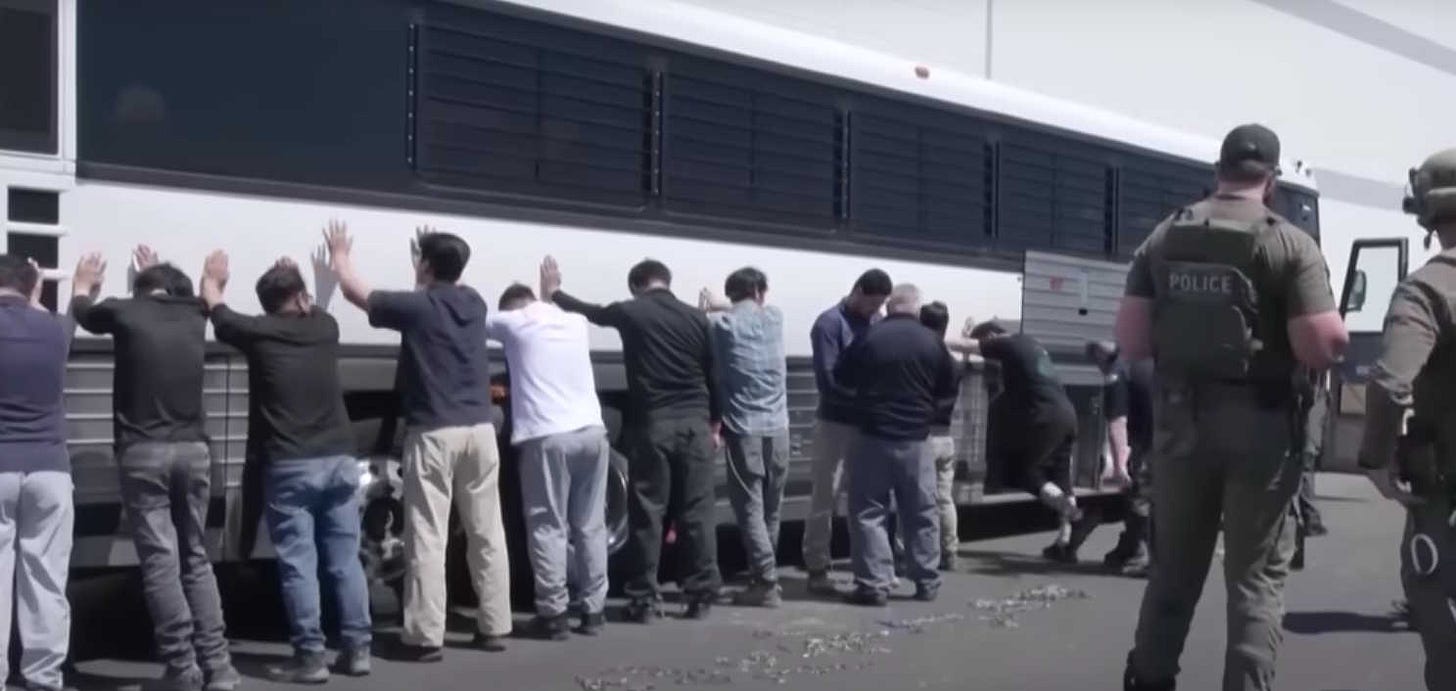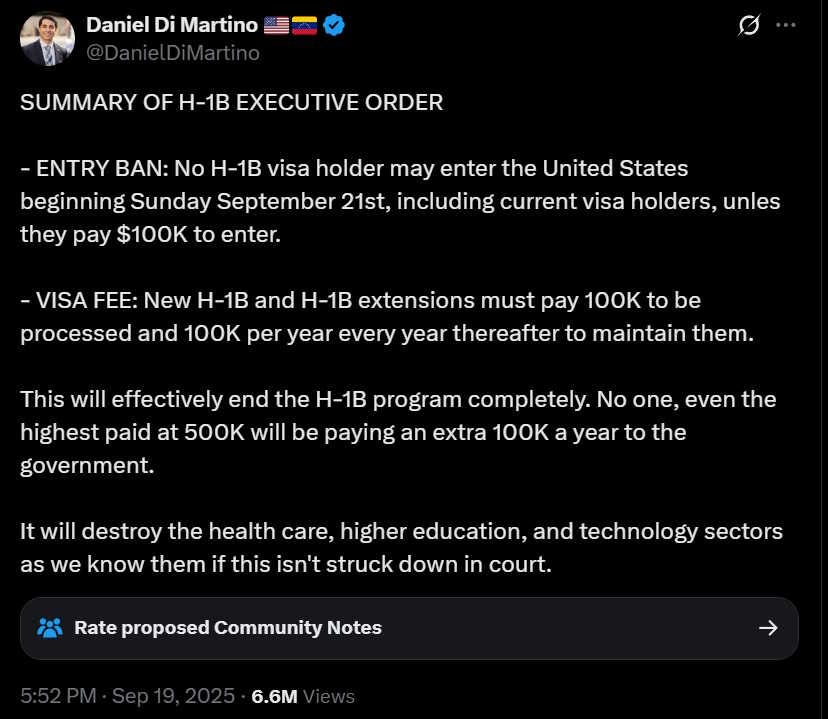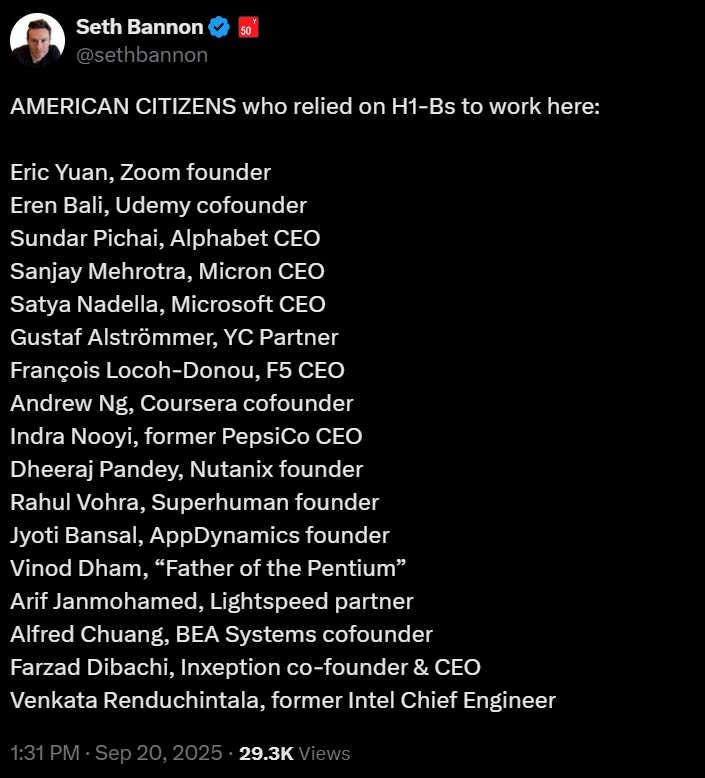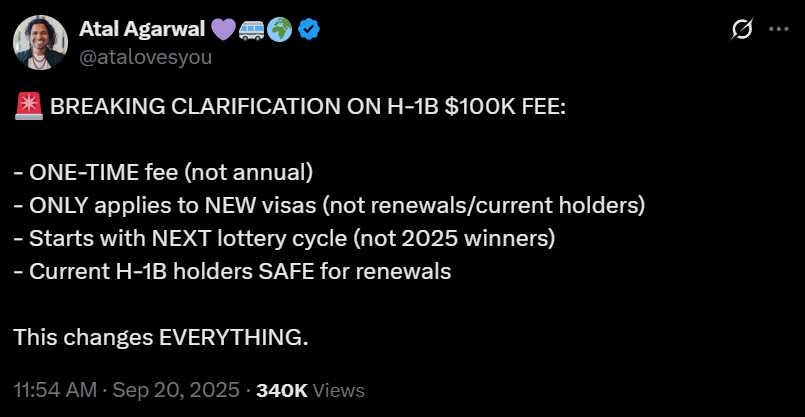Indians and Koreans not welcome
The Trump administration goes after Asian immigrants.
In the past, if you asserted that the Republican party is anti-immigration, someone would always pop up to angrily retort that the GOP is only against illegal immigration. Occasionally, someone would say that what conservatives really want is to shift our immigration mix from low-skilled to high-skilled.
If this were 1995 or 2005, perhaps conservatives really would be satisfied by policies that curbed illegal immigration while preserving the legal kind. But the Trump administration has made it crystal clear that it’s opposed to all immigration, including of the legal high-skilled variety that the right used to claim to want.
Just yesterday, Trump issued an executive order slapping incredibly harsh restrictions on the H-1B visa program. According to the order, and to clarifying remarks made by Commerce Secretary Howard Lutnick, anyone who employed an H-1B worker would have to pay $100,000 to the government every year that worker was employed:
An uproar immediately ensued. It wasn’t clear whether the order would hold up in court, but if it did, it would effectively kill the entire H-1b program. $100,000 a year is simply too onerous.
Killing the H-1b program would cause huge disruption to much of the U.S. tech industry and to the university system as well. The tech industry is very international; often the people who bring key ideas to a startup are at first only able to come work in America via H-1b. A lot of universities initially depend on H-1b visas to bring over faculty and researchers. In general, critical knowledge workers will eventually get employment-based green cards,1 but this takes a lot of time and effort; usually, they have to come on H-1b first, and apply for green cards while working in America.
As a result, a lot of very successful and famous Americans needed the H-1b to get their start in the country:
Cut off H-1b, and you cut off much of the pipeline of skilled legal immigrants to the U.S.A.
Whether or not the Trump administration was aware of the ramifications of the order will probably never be known. But the size of the uproar — which was probably assisted by some frantic behind-the-scenes maneuvering by the “Tech Right” — caused the administration to do one of the hasty backtracks for which it has become famous. Within a day, U.S. government agencies were tweeting that the new rule is only a one-time fee rather than a repeating one, and that it doesn’t apply to existing visa holders. There was an instant wave of relief.
If the $100,000 fee holds up in court, it’ll still place a significant burden on H-1b employers and workers,2 but not an insurmountable one. And it looks like foreign students may be exempted from the fee, which would bias the visa program toward people who study at U.S. universities and away from people who are hired directly from overseas. That would actually be good, since the former are especially desirable.
But in any case, the order, in whatever form, is still a significant attack on skilled immigration. And it wasn’t the most egregious one we’ve seen in recent weeks. A couple of weeks ago, ICE raided a Hyundai battery factory in Ellabell, Georgia, arresting hundreds of South Korean workers:
A sprawling Hyundai manufacturing plant in a quiet southeast Georgia community became ground zero on Thursday for one of the most extensive immigration raids in recent US history. The operation, months in the making, ended with 475 arrests, most of them Korean nationals…[N]early 500 federal, state and local officers poured into the sprawling battery production facility, still under construction…The high-stakes raid…was the result of…a meticulously coordinated investigation involving multiple federal and state agencies and weeks of intelligence gathering…marking the largest sweep yet in the current Trump administration’s immigration crackdown at US worksites…
Federal agents descended on the Hyundai site Thursday morning like it was a “war zone,” a construction worker at the electric car plant told CNN…All 475 people taken into custody were illegally in the US, said Steven Schrank, a Homeland Security Investigations special agent in charge. Some crossed into the US illegally, some had visa waivers and were prohibited from working, and some had overstayed their visas, he said.
The raid on the South Koreans, by all accounts, was very harsh and brutal, with various medical incidents among the detainees, and frequent threats of violence by the federal agents.
The raid wasn’t illegal, of course, or even against the letter of the law. These workers were not working legally (except for one who had a valid visa and was detained anyway, for some reason). Most of them were in a legal gray area — their temporary permits allowed them to do certain kinds of work but not others. But they certainly possessed skills that were important to the build-out of a critically important U.S. manufacturing industry.
Both of these actions were very bad, and will be detrimental to America’s wealth and power. The negative impact of the raid on the Hyundai factory is obvious — the mass arrest has caused an international incident, inciting rage among the Korean populace, and prompting some Korean politicians to demand an official apology from the U.S. Meanwhile, an absolutely massive amount of planned Korean investment into the U.S. is now being reconsidered or put on hold, threatening Trump’s dreams of reindustrialization.
As for the H-1b case, the program has a variety of problems. Some companies that abuse the system — hogging H-1b slots for low-value outsourcing workers, or treating H-1b employees like indentured servants. I wrote about these problems, and how to fix them, in a post back in 2022:
Let me just quote myself a bit:
[C]oncerns over the H-1b program…deserve serious consideration…If some employees can’t change jobs, they won’t have much leverage to negotiate for raises. H-1b visas are not hard to transfer, but if a worker is in the process of applying for a green card, that transfer (which is really a cancellation and reapplication) can be a lot more difficult. And if visa workers desperately fear losing their jobs — an H-1b worker who gets laid off has to leave the country if they can’t find work in 60 days — they’ll accept lower wages. These two effects will tend to put downward wage pressure on other workers, who have to compete with the H-1b holders…
As it happens, there’s…some direct evidence against [this] common fear. Mithas and Lucas (2010) studied compensation of H-1b workers compared to their native-born colleagues, and found that after controlling for observable determinants of skill, the visa holders actually earned more…This is exactly the opposite of what you’d expect if H-1b workers were forced to accept low wages because they’re yoked to their employers…
In fact, H-1b workers do lots more than just compete with [native-born workers]. They boost the economy in at least two important ways.
First, having more skilled workers in an area enhances clustering effects…H-1b workers increase the size of [the] pool [of skilled workers in American cities], and so they make a whole city a more attractive destination for investment. That will tend to raise both employment and wages — including for native-born workers in the same industry!
In fact, there are multiple studies showing that either this effect, or some other benefit of H-1b workers, dominates any competitive pressure when it comes to the effects on the native-born.. For example, Peri, Shih and Sparber (2015) find that “increases in STEM [H-1b] workers are associated with significant wage gains for college-educated natives.” Kerr, Kerr, and Lincoln (2015) find “consistent evidence linking the hiring of young skilled immigrants to greater employment of skilled workers by the firm”…
The second way H-1b workers help the U.S. economy…is through innovation…Lincoln and Kerr (2008) find that increases in H-1b levels increase patenting (without decreasing patenting by the native-born). Khanna and Lee (2018) find that when a company is lucky enough to get more H-1bs, it introduces more new products and its revenue goes up. Dimmock, Huang and Weisbenner (2019) find that startups that win the H-1b lottery get more VC funding and have more successful IPOs. Though it’s hard to measure, these innovative activities probably generate economic activity far from the city or company where the H-1bs work, and so they boost wages and employment for native workers in addition to the ones found in the earlier studies.
The idea that the main effect of immigrants is to compete with native-born American workers is incredibly seductive, simple, and persistent. It is also, generally speaking, wrong.
And here are a couple more papers:
Mayda et al. (2017) found that when national H-1b numbers were restricted, employment for similar native-born workers didn’t rise…
Mahajan et al. (2024) found that companies who won the H-1b lottery didn’t hire fewer “H-1b-like” native-born workers. They conclude that “lottery wins enable firms to scale up without generating large amounts of substitution away from native workers”.
Glennon (2023) also finds evidence that when we do restrict H-1bs, it leads to more offshoring; if companies can’t hire tech workers here in America, they will hire them elsewhere. This is because A) tech workers earn even less when they’re working overseas, so the wage competition is stiffer, and B) when they’re overseas, tech workers don’t spend their money in America and stimulate local economies.
On top of all that, there’s evidence that the H-1b program is great for startups. Dimmock et al. (2019) found that startups that win the H-1b lottery end up getting more VC money, patenting more, and having more successful exits.
So there’s a ton of research showing that the H-1b program is very important and good for Americans. In my experience, opponents of H-1bs tend to just dismiss this research without even looking at it, or impugn the motives of the studies’ authors. They almost never seriously engage with the literature. Occasionally one will search around and dig up a rare paper saying that H-1bs do compete down the wages of U.S. workers — usually Bound et al. (2017). But Bound et al. (2017) is a structural estimation paper — it concludes that H-1b workers reduce native-born wages because it assumes away the induced investment demand mechanism by which those workers increase native-born wages. Of course, the people pulling up the paper rarely if ever realize that.
The almost religious zeal with which people attack the H-1b program tells me that there’s something else going on here. Oftentimes, that “something” is anti-Indian racism. Around Christmas of last year, there was a huge battle on X between the Tech Right and the alt-right over Indian immigration. The alt-right unleashed a fiery attack on Indians, much of it directed at H-1b workers (who are about 70% Indian these days):
The Tech Right won the battle thanks to Elon Musk — himself a former H-1b worker — who threatened to “go to war on this issue the likes of which you cannot possibly comprehend”. But the alt-right won the war, because anti-Indian hate became widespread on X. Some of the hate-posts were opportunistic trolling from Pakistan, but most were homegrown;3 the alt-right simply found Indians an easy target. Despite Musk’s attempt to protect them, Indian-Americans went onto the hard right’s list of targeted groups. Once you’re on that list, it’s very hard to get off of it.
In fact, that shift was probably in the works for a while. During Trump’s 2016 campaign, alt-right influencer Steve Bannon said the following:
In response to Trump actually arguing that we need to keep some immigrants in the country, Bannon says, "When two-thirds or three-quarters of the CEOs in Silicon Valley are from South Asia or from Asia, I think... A country is more than an economy. We're a civic society."
Bannon’s argument here is that even the highest-skilled immigrants from Asia are suspect, because they’re unlikely to have America’s best interests in mind.
And in 2022, right-wing law professor Amy Wax attacked Asians for leaning toward the Democratic party:
Maybe it’s just that Democrats love open borders, and Asians want more Asians here…But as long as most Asians support Democrats and help to advance their positions, I think the United States is better off with fewer Asians and less Asian immigration.
Wax has also made many negative comments about Indians specifically.
So there was probably a roiling undercurrent of negative sentiment towards Asians, and Indians in particular, on the political right for many years. Now, with the right’s political ascendance and the weakening of progressives’ cultural power, the submerged anti-Indian sentiment is boiling to the surface.
To some degree this is to be expected. Indian Americans are stunningly successful — they’re the country’s most elite minority, with the highest income, the most education, and plenty of representation in science, politics, entrepreneurship, and upper management. It was inevitable that some people in the U.S. would envy that success, and that some would fear it.
A similar thing happened with Jews a hundred years ago. Some incumbent elites tried to shut Jews out of the Ivy League and the upper echelons of business. Others believed that Jews would not understand American values or have America’s interests at heart. And still others feared that Jewish people would support each other in the business world to the exclusion of others.
You can see all of those reactions happening with regards to Asians today — and especially to Indians. Famously discriminatory practices at the Ivies have worked to keep Asian numbers down (something that right-wingers have actually fought against). The alt-right thinks of Indians as resident aliens, conspiring for their own profit at the expense of the nation.
And as for self-dealing and ethnic exclusivity, I’m starting to hear this charge thrown around a lot as well, on social media and even in some San Francisco parties.4 The X user “Power Bottom Dad”, a harsh critic of H-1bs, has identified at least two lawsuits in which a big American company was accused of preferentially hiring Indians or discriminating against U.S. citizens. Whether that is a general pattern, as Power Bottom Dad asserts, or a couple of isolated incidents that could be found from time to time among any ethnic group in America, is probably irrelevant to the politics of the issue; what matters is that there is a portion of Americans out there who see Asian immigrants, and particularly Indian immigrants, as a clannish self-dealing cartel.
The other notorious backlash against an immigrant elite in America, of course, was the Japanese internment during World War 2. Although officially about preventing Japanese Americans from turning traitor, the internment also allowed opportunistic white California farmers to push their Japanese competitors out of the market. We haven’t seen anything like that yet with Indians, Koreans, or other Asian groups, but if there’s a conflict with China while Trump is President, we could see persecution of Chinese people.
But anyway, while figures like Amy Wax and Steve Bannon are odious, I’m actually slightly sympathetic to the fear of a demographic turnover among the elite. The number of slots for elite politicians, businesspeople, and academics in America is fairly constant, so it does become a zero-sum competition. It’s natural to be afraid of getting pushed out of that elite by hard-charging immigrants who were selected for their genius — and also by ethnic cartelization to monopolize the elite.
The price of that fear, however, is simply very high. This is not the 19th century; America has low birthrates among its elite (and in general), so it can’t replenish its elite through reproduction. Instead, if we want to keep having the world’s best engineers and researchers and such, we need to import some of them. Cut off that flow, and Americans will discover why a country with only 4% of the world’s population can’t remain the center of global research and development without a lot of skilled immigration.
On top of that, Trump’s poor treatment of Indian H-1b workers and Korean construction workers will end up weakening America’s alliances — and economic relationships — with those two Asian countries. Weakened alliances in Asia will make it nearly impossible for the U.S. to effectively resist the encroachment of Chinese power.
So right-wing fears of an Asian-led America are going to end up making the actual America poorer and less globally relevant. Personally, I don’t think that tradeoff is worth it. Demographic change among the elite can be unsettling, but not as unsettling as a collapse of America’s global power and domestic economic dynamism. We’ve dealt with a changing elite before, and it worked out fine; we can do it again.
Or O-1 visas, which can be renewed infinitely and thus act a little bit like a green card.
It will also be a vehicle for corruption, since — like many of Trump’s policies — the $100,000 fee can be suspended at the President’s discretion.
I even heard a second-hand anecdote about a rich right-wing guy who maintains a huge army of anti-Indian hate bots to post on X and other social media sites.
Of course, these parties included plenty of Indians.








"Trump’s poor treatment of Indian H-1b workers and Korean construction workers will end up weakening America’s alliances "
Admittedly this is pedantic, but imo calling the Korean Hyundai plant workers construction workers is incorrect. As I understand it, all or nearly all of them worked for companies supplying battery manufacturing equipment being installed at the plant.
This battery making gear is among the most advanced manufacturing technology in the world and there are likely only a few thousand workers on the planet that have the skills these workers have.
The Trump administration chaining and frog marching these elite workers in a ritual of public humiliation was a shocking display of their incompetence.
One aspect of this that I have not seen brought up is that this is also very anti-small business. Large tech companies are not the only ones that hire foreign workers many smaller companies do so as well at is often out of necessity rather than an attempt to hire talent cheaply. We were growing a company in the rust belt that required very intelligent and in some cases very specific skills (foreign language) but generally the smartest MBA’s we could find had no interest in starting their careers in a second tier city in decline. We provided top quality workers with sponsorship up to the green card level. We also found these workers were more loyal than native workers. My grandfather got to emigrate for a similiar reason: nobody wanted to become or had the skills to be a cooper. Well in 1957 how do you think pickles got made without wooden barrels being repaired and replaced.